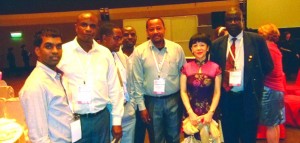By Jainarine Deonauth in Hong Kong
Climate change is being featured on the agenda of the 19th Consumer International World Congress, currently being held in Hong Kong, where over seven hundred delegates from more than 60 countries are engaged in discussions and debates on important issues affecting consumers worldwide.

- Delegates at the 19th Consumer International World Congress, including Jainarine Deonauth, a representative of the Guyana Consumers Association

